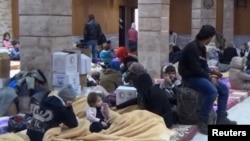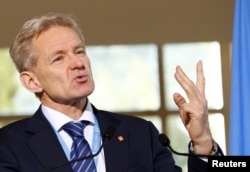The United Nations has accused the Syrian government and opposition groups of denying humanitarian access to hundreds of thousands of civilians trapped in besieged areas.
Jan Egeland, the special adviser for Syria, called December and January the worst months for the delivery of life-saving aid. He said only half of the area and population the U.N. wanted to reach has been approved for access in full.
Egeland said trying to get aid missions under way even after the government has given approval to the U.N.'s monthly plan is frustrating.
“We now end up in this complete, hopeless bureaucratic quagmire of having to seek facilitation letters, permits, security permits — having the governor's office to agree on access, the security forces, the security committees,” he said.
Meeting set for Monday
Egeland said opposition groups give the United Nations similar difficulties. He said they also are making it difficult for aid to reach women, children and the wounded.
Russia, Turkey and Iran, guarantors of a Syrian truce, are to meet in the Kazakh capital, Astana, on Monday to work on a cease-fire agreement on Syria. The meeting is an important precursor to the proposed resumption of Syrian peace negotiations in Geneva on February 8. The United Nations has been invited to attend as an observer.
Egeland told VOA he hopes the three guarantor powers will be able to stop what he termed the obstructionist practices of the warring parties. Egeland said he hopes the Astana meeting will mark a new beginning for the civilian population of Syria, which has been at war for nearly six years.
“The way it is now, it cannot continue,” Egeland said. “The government has to change the way it is blocking our humanitarian access to civilians, but also the armed opposition groups …who are responsible for the besiegement of Foah and Kafraya — they also are not helping us at all.”
Airdrops of food suspended
Egeland said he is particularly concerned about the fate of some 93,000 civilians in the besieged city of Deir Ezzor. He said airdrops of food, which have proven to be a lifeline for them, were suspended Sunday because Islamic State militants have captured the drop zone.
He said another area of concern is the Wadi Barada valley near Syrian capital, Damascus.
Egeland said fierce fighting has recently displaced thousands of families and is making it impossible for engineers to repair a water supply system, which is the main source of water for 5.5 million inhabitants of Damascus.












